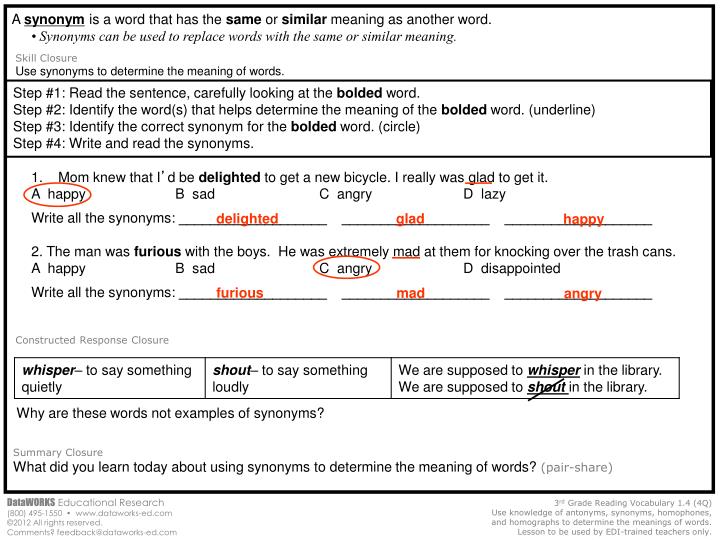
Synonyms are other words that mean the same thing. Contains 1 footnote and 5 figures.A synonym is a word, adjective, verb or expression that has the same meaning as another, or almost the same meaning. (Six appendices are included: (1) Research Related to the Three-Ring Conception of Giftedness and the Schoolwide Enrichment Model (this appendix includes individual footnote, table, and reference list) (2) Sample Teacher Training Exercise for Completing the "Scales for Rating the Behavioral Characteristics of Superior Students-R" (SRBCSS-R) (3) Renzulli Identification System: Identification Summary Form (4) Sample Instruments (5) Goals and Skills Related to Two Types of Giftedness and (6) Action Information Message Elementary & Action Information Message Secondary.

This identification system is not as tidy as using cut off scores, but the trade off for tidiness and administrative expediency results in a more flexible approach to identifying and serving young people with great potential. Training activities are provided to help teachers use the various nominations to best serve their students. These potentials are recognized through teacher nominations, using the Scales for Rating the Behavioral Characteristics of Superior Students (SRBCSS), special nominations, and Action Information nominations.


The system respects and includes students who earn high scores on traditional measures, but leaves room for students who show their potentials in other ways. A key feature of this system is the formation of a Talent Pool that includes students who have been identified by both test and non-test criteria. It recognizes students with potential and provides opportunities to develop their talents through an integrated continuum of special services. This system provides for the identification of students who would benefit from services that recognize academic giftedness as well as creative-productive giftedness. Rather than labeling a student as "gifted" or "not gifted" this system provides for documenting specific strengths and using these strengths for making decisions about the types of activities and the levels of challenge that should be made available. Therefore, this identification system proposes that the services be labeled, rather than the students. Tidiness and efficiency are important to the operation of any complex enterprise, but they should never take the place of our responsibility to do the right thing in the best interests of the young people we serve through special services. This identification system therefore also attempts to activate a much broader range of services and teaching practices that are specifically designed to develop a variety of talents in young people. It is also firmly based on the assumption that there should be congruence between the criteria used in the identification process and the goals and types of services that constitute the day-to-day activities that students will pursue. It takes into consideration the fact that there is no perfect identification system. Grounded in the Three-Ring Conception of Giftedness and the Enrichment Triad Model, and supported by a thorough review of research dealing with the underlying theories, it is flexible enough to accommodate talent potentials in different domains, and it will respect regulations made by district policy makers and state departments of education. It is designed to be economical in terms of the time and paperwork required for identification, to provide access to special services for both traditionally high scoring students and those students whose potential may only be recognized through the use of a more flexible range of identification criteria. This monograph presents an identification system that attempts to address the excellence, equity, and economic issues. In most identification systems that follow the traditional screening-plus-selection approach, the "throw-aways" have invariably been those students who qualified for screening on the basis of non-test criteria. Controversy about which students should be selected for participation in programs for the gifted and talented has existed since the inception of special services for this segment of the school population.


 0 kommentar(er)
0 kommentar(er)
